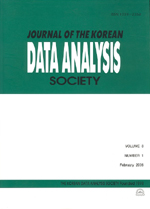국내 주식시장에서 외국인 투자자 선호요인 분석
A Study on Foreign Investors Behavior Pattern in Korean Stock Market
- 한국자료분석학회
- Journal of The Korean Data Analysis Society (JKDAS)
- Vol.7 No.2
-
2005.04565 - 572 (8 pages)
- 2

우리나라 주식시장은 1992년 외국인 투자자의 주식취득을 허용한 이후 취득한도를 점진적으로 확대하다가 외환위기를 계기로 1998년 5월 완전히 개방하였다. 외국인의 주식취득한도가 완전히 폐지됨에 따라 주식시장에서 외국인의 비중은 급격히 증가하여 최근에는 40%를 초과하게 되었으며, 외국계 펀드 등이 대량지분을 보유하는 사례도 증가하고 있다. 이에 따라 외국인 투자자의 영향력도 커지면서 그들의 투자선호 요인에 대한 관심도 높아지고 있다. 따라서 본 연구에서는 국내 주식시장에서 외국인 투자자 선호요인을 거래소 상장기업 자료를 이용하여 실증분석을 하였다. 실증분석 결과 외국인 투자자들은 기업의 자기자본 수익률이 높고, 시가총액이 크며, 총 주식 시세와 같은 추세로 움직이는 기업의 주식을 선호하고 있다. 반면, 단타꾼에 의한 주식의 거래량이 높아져 회전율이 높은 기업의 주식과 부채비율이 높은 기업의 주식은 회피한다고 볼 수 있다. 따라서 외국인 투자자의 주식보유비중은 수익성이 우량한 기업에 집중되고 있음을 알 수 있다.
This paper empirically looks into foreign investors behavior pattern in Korean stock market using about 300 companies financial data from 1988 to 2002. In particular, we examine the relationship between the foreign investors behavior pattern and the other factors such as profitability ratios, liquidity ratios, market ratios, and capitalization ratios. Results of multiple regression analysis employing from 1988 to 2002 financial data of the companies listed in the Korean stock market show that profitability, debt ratios to asset, trading volume and share holdings by companies affect foreign investors behavior and other factors are not statistically significant. Therefore, the major findings are that foreign investors tend to invest higher profit performance companies and avoid to invest the companies which have higher debt ratios and higher trading volume.
Ⅰ. 서론
Ⅱ. 기존 연구의 검토
Ⅲ. 분석 자료 및 방법
Ⅳ. 분석결과
Ⅴ. 결론
참고문헌
(0)
(0)